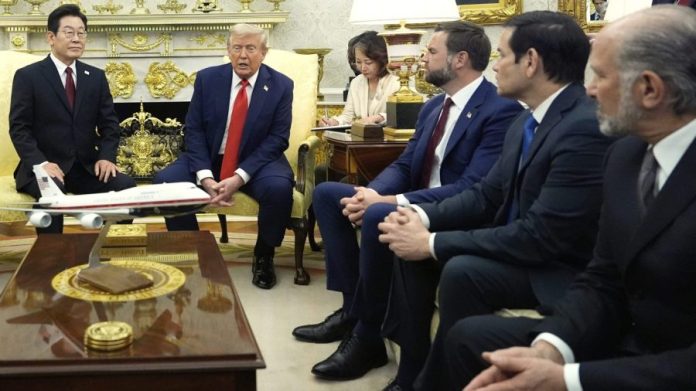
President Trump’s international economic policies crashed into each over the weekend, when hundreds of South Korea workers were arrested by U.S. immigration officials at a Hyundai factory in Georgia only weeks after the two countries announced a new trade arrangement that was hailed by both sides.
Trump’s immigration crackdown has largely focused on the U.S. southern border and has taken place separately from his ongoing reset of international trade. But the collision of his two agendas Saturday sparked tensions.
The 300 South Korean workers who were detained in the immigration raid are likely to leave the U.S. without being formally deported after official consultations between Seoul and Washington, the Yonhap news agency reported Monday, citing a South Korean foreign ministry official.
South Korean Foreign Minister Cho Hyun said on Saturday he was considering a visit to the U.S. to discuss the arrests made at the battery plant in Ellabell, Ga.
“We are deeply concerned and feel a heavy sense of responsibility over the arrests of our nationals,” Cho said during an emergency meeting, according to Yonhap. “We will discuss sending a senior foreign ministry official to the site without delay, and, if necessary, I will personally travel to Washington.”
While trying to boost domestic production and create manufacturing jobs, the White House has also been trying to get foreign companies to invest more in the U.S. The weekend raid at the battery plant appeared to some policy specialists as the administration tripping over its own objectives.
“There probably wasn’t any coordination in terms of how to address the part where we want to revive American manufacturing, and get foreign investors to invest billions in the U.S., but then also provide a process that also allows workers to come in to set up the factory,” Andrew Yeo, senior fellow and Korea chair with the Brookings Institution, told The Hill.
South Korean companies have been investing heavily in the U.S. in recent years, with Samsung Electronics and SK Hynix putting capital into semiconductor production, and SK On Co. and Samsung SDI building battery factories with American carmakers GM and Ford.
The immigration raid at the Hyundai-LG facility over the weekend has sent shivers through Korean-American businesses and sparked concerns that joint ventures between the two countries are being put on notice. Korean companies are involved in numerous sectors of U.S. heavy industry, including shipbuilding, power equipment and steel production.
“There are growing concerns in the business community that major Korean investment projects in the U.S. could be affected,” the Korean Economic Daily, a business trade publication, reported Monday.
The U.S. and South Korea announced a $350 billion joint economic initiative at the end of July, premised on the reduction of U.S. tariffs on Korean imports to 15 percent from 25 percent.
The new fund set up by the agreement “will help Korean companies actively enter the U.S. market in industries where we have strengths,” President Lee Jae Myung said in a social media post, mentioning the fields of shipbuilding, semiconductors, energy, biotechnology and batteries.
While the new initiative lacked many specifics, the weekend immigration raid puts it in a new light, drawing concern from former officials about the scale of South Korean investment in the U.S.
“I’m really speechless and furious,” Choi Jong-gun, South Korea’s former vice foreign minister, told The Washington Post on Monday. “We spend a lot of money in the United States and we get slapped in the face.”
Trump’s sprawling immigration crackdown is expected to result in a net outflow of about 205,000 people from the U.S. this year, according to an estimate from the American Enterprise Institute, a drop that is likely already showing up in labor data and is set to have lasting economic effects.
The U.S. added just 22,000 jobs in August, bringing the three-month average down to 29,000 new jobs created per month. The unemployment rate also ticked up last month from 4.2 percent to 4.3 percent, as jobseekers outnumbered available positions by around 200,000.
Manufacturing jobs in the U.S. have been declining in recent months, despite the administration’s stated efforts to increase them. Jobs in the sector fell by 12,000 in August after dropping by 2,000 in July and 17,000 in June. Since last year, manufacturing employment has fallen by 40,000 positions, continuing a longer term trend.
Economists think the reduction in immigration is going to change the definition of “full employment,” which is what the Federal Reserve considers when it tweaks the overnight interbank interest rate.
“Potential employment growth, meaning employment growth when the labor market is operating sustainably at ‘full employment,’ could be between 10,000 and 40,000 jobs a month in the second half of 2025 (down from 140,000 to 180,000 in 2024), and potential job growth could turn negative in the second half of Trump’s term,” economist Wendy Edelberg and others wrote for AEI in July.
The immigration raid also injects new uncertainty into the policy environment, something that businesses have been frequently complaining about during the stop-and-start delivery of Trump’s new tariff regime.
“With all these challenges and obstacles, it’s really hard to make any predictions and forecasts in terms of how well your business is going to grow in the U.S.” Brookings’ Yeo said. “That’s something that I think the South Koreans will be thinking about.”

